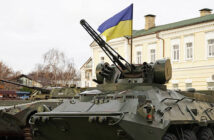Written by Chris Doyle.
 Indonesia has announced that it will increase next year’s military budget by 35 per cent. The increased attention to defence is regarded as long overdue. Much of Indonesia’s military hardware is out of date, while regional powers such as China are ramping up their military development. The United States will most likely be heartened by the news, as it could ease some of the pressure to maintain a large strategic presence in Asia.
Indonesia has announced that it will increase next year’s military budget by 35 per cent. The increased attention to defence is regarded as long overdue. Much of Indonesia’s military hardware is out of date, while regional powers such as China are ramping up their military development. The United States will most likely be heartened by the news, as it could ease some of the pressure to maintain a large strategic presence in Asia.
Over the past decade, military investment and development in Indonesia has been relatively stagnant. In that time, while the Indonesian defence budget has remained relatively constrained, China’s military spending has increased threefold. In addition, the US implemented an arms embargo against Indonesia in 1999 in response to human rights violations in East Timor. Consequently, the past decade has seen the Indonesian armed forces utilising outdated and obsolete military hardware, which has been blamed for a series of lethal air accidents and malfunctions.
The embargo was lifted in 2005, and Jakarta has now approved the much-needed 35 per cent budget increase. One of the key investments to be made with the additional funding will be the purchase of jet fighters. On the cards is an interim order of second-hand F-16s from the US, followed by new aircraft being built in South Korea, including the T-50 Golden Eagle.
The renewed focus on military development is a response to developments outside Indonesia’s borders; the republic’s 460,000-strong army has traditionally focussed on domestic stability. Current president Susilo Bambang Yudhoyono, when announcing the budget increase, added that Indonesia will continue to push to achieve a status of minimum essential force (MEF) by 2025. Observers believe that Indonesia is aiming to achieve MEF status so it can take a more proactive strategic role in the region, possibly acting as a mediating force between a number of nearby countries contesting territory in the South China Sea.
The United States will most likely be encouraged by the budget increase. Facing possible budget cuts of its own, the US is looking to partners in Asia to take a greater stake in the maintenance of security and stability in the region. Other regional partners, such as Japan and South Korea, have been reluctant to increase their military budgets, so the significant increase in Indonesian spending will be welcomed. The revenue generated by the sale of US military hardware to Indonesia will naturally also be welcomed. This is a trend that is likely to spread to other South-East Asian countries wary of China’s rise. The recent US-Vietnam military exercises, as well as the likely expansion of the US presence to Darwin, are indicators that the strategic significance of South-East Asia is increasing.





